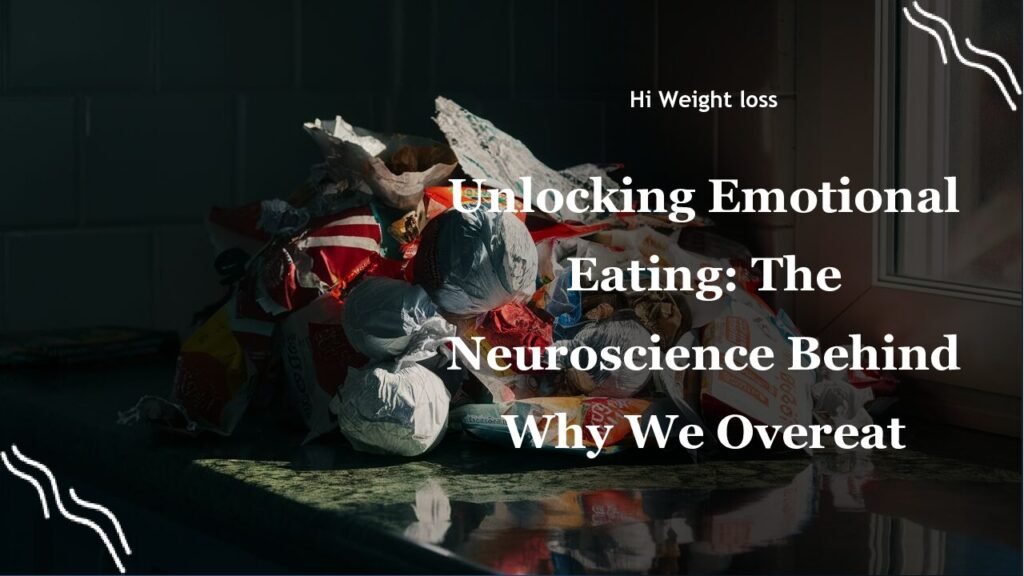“`
Have you ever found yourself reaching for a snack when you’re not actually hungry, maybe after a stressful day at work or during a moment of sadness? This is a common experience, and it’s often referred to as emotional eating; it’s more than just a lack of willpower. It’s deeply rooted in the way your brain responds to stress and emotions and that’s why it’s helpful to understand what’s going on in your brain when you emotionally eat. In this article, we’ll delve into what is the neuroscience behind emotional eating, looking at the complex interplay of stress hormones, reward systems, and learned behaviors to help you understand why it might happen and what you can do about it.
What is the Neuroscience Behind Emotional Eating?
The Stress Response and Cortisol’s Role
When you encounter stress, your body releases a hormone called cortisol. Normally, cortisol helps regulate your body, including suppressing appetite. But for emotional eaters, this system often malfunctions. Instead of appetite suppression, the stress response triggers a heightened desire for food, even if you’re not physically hungry.
I remember a time during a particularly stressful project at work when I would find myself constantly snacking throughout the day. This wasn’t about true hunger, but rather about the stress and anxiety I was feeling. Research backs this up, showing that individuals who engage in emotional eating often exhibit elevated anxiety levels and increased cortisol responses when faced with stressful situations according to studies.
Dopamine and the Reward System
The brain’s reward system, driven by the neurotransmitter dopamine, plays a significant role in emotional eating. Have you ever noticed how some foods just taste “better” when you’re feeling down? This is because emotional eaters often have a heightened response in their dopaminergic system, causing them to perceive food as particularly rewarding during times of stress or negative emotions. This response is similar to how someone might use a drug, leading to a release of dopamine in the brain when consuming food as highlighted by research.
I once had a friend who would always crave sweets after a tough breakup. It wasn’t just about the sugar; it was the emotional comfort she sought, a temporary dopamine boost to alleviate the pain. The food became associated with feelings of relief, even if it was only fleeting.
Brain Activation and Habit Formation
Interestingly, functional magnetic resonance imaging (fMRI) studies reveal that emotional eaters show reduced brain activation in areas associated with reward processing, such as the nucleus accumbens, when exposed to food cues during stress. This reduced activation might actually cause an urge to compensate, using emotional eating to normalize the reward circuitry. It’s like the brain is seeking a dopamine “fix” to balance itself out.
This reduced activation combined with the repeated act of emotional eating can lead to the formation of a strong habit. The initial reward becomes an automatic response to stressful situations, almost like your brain is trained to associate stress with eating.

Environmental and Genetic Factors
It’s important to note that emotional eating is not just about brain chemistry; it’s also influenced by both environmental and genetic factors. The availability of unhealthy foods and the stresses of everyday life can easily trigger episodes of overeating, often leading to feelings of regret. Some individuals may also have a genetic predisposition to emotional eating, which makes it more likely that they develop the habit. However, environmental elements are a major contributing factor in its development according to several studies.
Think about your own environment – are you surrounded by easy access to comfort foods? Do you often find yourself under stress? These situations can be a fertile ground for emotional eating. It’s like a perfect storm where biology and environment join forces.
Emotional Eating as a Coping Mechanism
Ultimately, emotional eating is often a coping mechanism used to deal with stress and negative emotions. Over time, the initial reward response morphs into an automatic behavior, triggered by stressful circumstances. It’s like your brain has created a direct path: stressful situation equals eating.
For instance, if every time you feel anxious about a deadline at work you go out and grab a burger, your brain starts to learn that this is the way to handle stress. It’s all about the associations that form over time and the brain’s automatic response. This type of learned behavior is hard to break, because it has been reinforced over and over.
Key Takeaways
In short, what is the neuroscience behind emotional eating? It’s a complex interaction involving heightened stress responses, alterations in the reward system, and the development of coping mechanisms rooted in habit formation. Let’s take a look at this table:
| Factor | Description |
|---|---|
| Stress Response & Cortisol | Heightened cortisol levels in emotional eaters lead to increased cravings, not appetite suppression. |
| Reward System & Dopamine | Enhanced dopamine response makes food seem more rewarding, especially during stress. |
| Brain Activation | Reduced reward-related brain activity during stress can trigger emotional eating to normalize reward circuitry. |
| Environmental & Genetic Factors | Unhealthy food availability and stress, along with genetic predispositions, contribute to emotional eating. |
| Coping Mechanism | Emotional eating becomes a habit, moving from a reward response to an automatic reaction to stress. |
Conclusion
Understanding the neuroscience behind emotional eating is a crucial first step in addressing the problem. It’s not about a lack of willpower, but rather about a complex interplay of biological and psychological factors that lead to this behavior. From the release of cortisol under stress to the dopamine rush associated with comfort food, many processes within the brain reinforce the habit of emotional eating. Recognizing these mechanisms and that is has a scientific basis can empower you to move away from blaming yourself. You’re not alone in this, and understanding the underlying causes can help you create a more balanced relationship with food and emotions.
Now that you know more about this problem, consider sharing this article with others who may be struggling with similar issues. The first step towards a better relationship with food and your emotions is understanding the problem and taking it from there. Knowledge is power, and by understanding how your brain works, you can make better choices that support your mental and physical health.
FAQ
Can emotional eating be completely overcome?
Yes, with the right strategies and support, emotional eating can be managed and overcome. It may take time and effort to develop new coping mechanisms, but it is certainly possible.
What are some healthier coping mechanisms to replace emotional eating?
Some effective alternatives include exercise, meditation, spending time in nature, talking with friends or family, engaging in hobbies, and journaling. It’s important to find what works best for you.
Is emotional eating a mental health disorder?
While emotional eating is not a formal mental health disorder on its own, it can be a symptom of underlying issues such as anxiety or depression. If you feel like it’s significantly impacting your life, it’s important to seek professional help. Research shows that it’s often linked to other issues.
How can I tell if I am an emotional eater?
If you regularly eat when you are not hungry, use food to cope with stress or negative emotions, feel guilty or ashamed after eating, and have a pattern of using food to address your feelings, you are likely experiencing emotional eating. Reflecting on your eating patterns and emotions will help to identify such a pattern.
Does genetics play a role in emotional eating?
Yes, genetics can play a role, but environmental factors have a major influence. If a close family member engages in emotional eating you may be more likely to develop the same pattern, but it is not predetermined. The key is identifying the patterns and breaking them according to several reports.
“`



